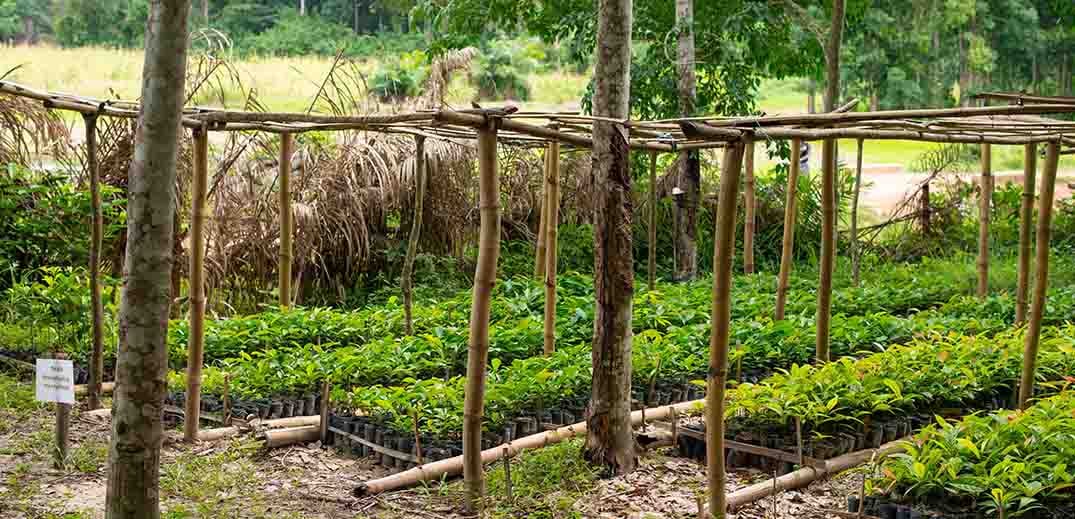
UNDP: Green bonds surpass $1 trillion in annual issuance
Green bonds have surpassed $1 trillion in annual issuance, showing the financial viability of sustainability-focused ...

A CHF 4 million multi-sectoral partnership is committed to contributing towards the protection and restoration of the classified Cavally Forest in Côte d’Ivoire.
Initiated by the Ivorian government, Earthworm Foundation and Nestlé in 2020, the Cavally Forest restoration project is now welcoming new partners to achieve greater impact. These partners include the Swiss Federal Administration (SECO) via the Swiss Platform for Sustainable Cocoa (SWISSCO) as well as companies Touton and Cocoasource, which work directly with cocoa and rubber cooperatives in the area affected.
This new collaboration follows in the footsteps of the initial, three-year project funded by Nestlé, which will run until the end of June 2023. The preliminary results are very encouraging. During its first phase, the Cavally project led to a significant reduction in deforestation, the natural regeneration of 7 000 hectares, and the reforestation of almost 1 500 hectares. In addition, greater economic and social resilience has been observed within local communities, with more than 1 400 people benefiting financially from the project.
Beginning on July 1, 2023, the new three-year phase of the project will have more ambitious goals and a wider group of partners.
This new partnership goes beyond preserving the classified Cavally Forest. It also aims to strengthen the resilience of the communities in the forest’s peripheral zone and improve the transparency and traceability of the cocoa and rubber supply chain.
The Cavally project has four main objectives, including preventing deforestation and improve the ecosystem by stimulating natural regeneration and rehabilitating degraded areas in close collaboration with local communities.
The project also aims to improve the resilience of small-scale producers by helping them increase their productivity, achieve greater income diversification and gain easier access to financing.
It also seeks to help protect the rights of the children of these producers by raising awareness and providing easier access to school, in particular by acquiring birth certificates.
The project is also meant to establish a more transparent supply chain for cocoa and rubber, in particular by improving traceability and exploring innovative solutions (including satellite monitoring) to increase the transparency of prices and payments to producers.
“During the first phase of the Cavally Forest regeneration project, we learned that there are various sides to the problem of deforestation in the area,” said Bastien Sachet, CEO of Earthworm Foundation, the organization leading the implementation of the project.
“It is difficult to control such a large area. And the forest is attractive in terms of fertility and access to land for populations that are facing immense economic challenges. To combat deforestation and tackle the root causes of the problem, a collective approach based on creating value for producers and rural communities is required. This is why the presence of economic players in the rubber and cocoa value chains, coupled with a strong partnership with the government, is essential. It is the spirit of this collaboration that we are proud to be a part of.”
To maximize the project’s impact, this new phase now includes trading companies Touton and Cocoasource as well as Nestlé. They are active in the peripheral regions of the forest and already work with local cooperatives.
“The Cavally project is a very important initiative for us, as it allows our company to act directly within our supply chain. We are protecting a forest adjacent to the areas where we source cocoa and creating value for the farmers we work with,” explained Corinne Gabler, Head of Confectionery & Ice Cream at Nestlé. “We’re delighted to have been able to contribute towards the success of this first phase and look forward to working with new partners to further intensify the project’s impact.”
Combating cocoa-related deforestation is also a priority for Switzerland, which has pledged to increase its investments in the primary sourcing regions.
“Switzerland is an important country for the trading and processing of agricultural products, including cocoa,” commented Monica Rubiolo, Head of Trade Promotion at the Swiss State Secretariat for Economic Affairs (SECO). “That’s why our government is actively involved in the Swiss Platform for Sustainable Cocoa (SWISSCO). Through our financial support for specific projects, we aim to actively contribute towards the creation of more sustainable supply chains, in close collaboration with the private sector, civil society and governments in the producer countries.”
“We must continue our efforts,” declared Laurent Tchagba, Minister of Water and Forests in Côte d’Ivoire. “And this innovative partnership for our country reiterates our commitment to combating deforestation and strengthening the resilience of communities. I’m delighted that this project can be strengthened with trusted partners.”
Green bonds have surpassed $1 trillion in annual issuance, showing the financial viability of sustainability-focused ...
The World Bank (WB) delivered a record $43 billion in climate finance and are channeling ...
The transition of the Arctic from a carbon sink to a carbon source is one ...


اترك تعليقا